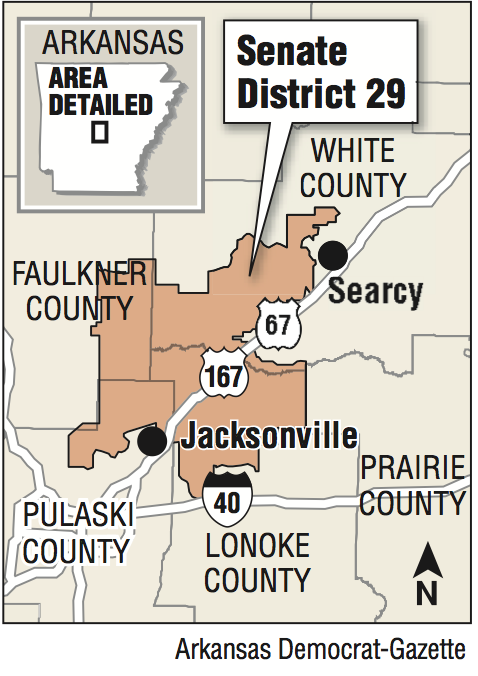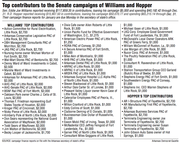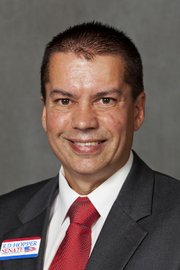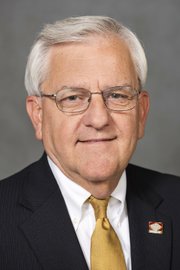CABOT — In his bid to oust state Sen. Eddie Joe Williams, Lonoke County Justice of the Peace R.D. Hopper says Williams pays too much attention to the needs of large corporations and the political establishment, and not enough to representing people like veterans and law enforcement officers.
RELATED ARTICLES
http://www.arkansas…">U.S. senator's record fodder in contest http://www.arkansas…">Womack, Mason vie for seat on high court http://www.arkansas…">Two in District 99 tout Linck's efforts http://www.arkansas…">Ex-Democrats Wagner, Rye set sights on House seat http://www.arkansas…">Early voting locations http://www.arkansas…">Local contested races http://www.arkansas…">Local and state district judicial races http://www.arkansas…">Party primary and nonpartisan judicial races http://www.arkansas…">March 1 primary changes campaigninghttp://www.arkansas…">Three try to unseat Cradduck in Republican primary http://www.arkansas…">Kinion, Mahony running for Washington County judge
FULL ELECTION COVERAGE
Williams disagrees with Hopper’s depiction of his tenure in the Senate, saying he has worked tirelessly on the behalf of veterans, law enforcement officials and others.
Hopper and Williams are Republicans from Cabot. They are seeking their party’s nomination in the March 1 primary in Senate District 29, which includes parts of Faulkner, Lonoke, Pulaski and White counties. The winner will be unopposed in the November general election.
The first-term senator is seeking re-election to a final four-year term, and he said he wants to work more on cutting the size of state government to make it as efficient as possible.
Williams, 61, has been in the state Senate since 2011 and chairs the Senate State Agencies and Governmental Affairs Committee. He was Cabot’s mayor from 2007-11 after serving five years on the Cabot City Council. He is retired from the Union Pacific Railroad, where he worked for more than 30 years in jobs ranging from laborer to regional director of transportation. He was born in Pine Bluff, graduated from Sheridan High School and attended Arkansas Baptist College.
Hopper, 49, has been a Lonoke County justice of the peace since 2015. He has owned Sonny’s Auto Salvage, south of Cabot, for 20 years. He was born in Batesville, graduated from Mountain View High School and has taken classes at Arkansas State University at Beebe and the University of Central Arkansas.
Hopper said people ranging from veterans to firefighters to law enforcement officers in Senate District 29 don’t have the representation that they deserve.
Williams “is someone who is listening more to the large corporations and the wishes of the political establishment and the establishment’s goals up there, and not fighting for the people that need somebody to fight for them,” Hopper said.
Williams countered: “My record speaks loudly.”
He said he’s helped enact legislation to make it easier for spouses of active military personnel to get professional licenses or certifications when they move to Arkansas, and pushed to provide more funding for child advocacy centers to help emotionally, physically or sexually abused children. He said he’s working to get a full-time state employee assigned to the Little Rock Air Force Base to assist veterans.
Williams has been a leading promoter in the Legislature for a constitutional amendment to change the state’s tort laws but said he doesn’t intend to propose such an amendment in the 2017 regular session.
“My focus will be reducing the size of government,” he said, noting that he opposed a plan to spend about $100 million on a new prison that would be financed with an increase in car license fees, and successfully sponsored legislation last year to encourage Gov. Asa Hutchinson to study the possibility of merging state agencies.
PRIVATE OPTION
The District 29 race is one of three state Senate primary contests in which Republican critics of the private-option program are attempting to defeat lawmakers who voted to authorize the use of federal funds for that program.
The program, authorized in 2013 by the Republican-controlled Legislature and then-Gov. Mike Beebe, a Democrat, uses federal Medicaid funds to provide private health insurance to some low-income Arkansans.
Authorized under the 2010 federal Patient Protection and Affordable Care Act, the private-option expansion of the state’s Medicaid program extended eligibility to adults with incomes of up to 138 percent of the poverty level: $16,105 for an individual, for instance, or $32,913 for a family of four.
Supporters of the private option say the program is a conservative alternative to the federal health care law passed under President Barack Obama and note that the state obtained waivers from the federal government for it.
Hutchinson, a Republican, wants to overhaul the private option to encourage recipients to work and take more personal responsibility for their health. He also wants to rename the program Arkansas Works.
Almost 250,000 Arkansans had been approved for coverage under the private-option program as of Nov. 30. That included about 199,000 who were in private-option plans and more than 22,000 others who were being covered by the traditional, fee-for-service Medicaid program because their health needs are considered exceptional.
The state will have to begin paying 5 percent of the cost of the program in 2017, and the state’s share will gradually increase to 10 percent by 2020.
Hopper said he opposes the private option and Arkansas Works because “it is all a form of Obamacare.
“It does three things I am against. It grows the government. It increases people’s dependency on government, and it spends [federal] money we don’t have,” he said. “I would vote to repeal the private option, and those people on the private option would be eligible to get their Obamacare through the federal exchange.”
However, more than 80 percent of Arkansans covered under the expanded Medicaid program have incomes below the poverty level and would be ineligible for subsidized coverage on the federal exchange if the state ended the Medicaid expansion, a spokesman for the state Department of Human Services said.
Williams said he voted to authorize the use of federal funds for the private option because he has to decide financial needs of the state — for example, whether the state is going to give tax breaks or continue to provide state funds to help finance the construction and renovation of public schools.
“We can’t suck three-quarters of a billion dollars out of the economy every year [in Arkansas through the federal health care law] and expect to continue doing the things that we want to do in this state” without tapping the federal funds for the private option to help hospitals and doctors assist low-income Arkansans, Williams said.
“My effort is to continue to grow the economy and apply conservative principles,” Williams said. “I hope the federal Obamacare is repealed, and we can get the money back into our economy with no strings attached.”
Williams said he’s “totally shocked” that Hopper supports moving Arkansans who are assisted under the private option onto the federal insurance exchange because he views that as advocating an expansion of “Obamacare.”
COMMON CORE
Hopper said he opposes the Common Core educational standards, and Williams has voted to implement the standards.
The state Board of Education voted in 2010 to adopt the Common Core standards in mathematics and English/language arts, putting Arkansas among more than 40 states and the District of Columbia to adopt the same set of standards.
Williams, who serves on the Senate Education Committee, said he voted for the state Department of Education budget in which the department asked to explore the Common Core standards.
The senator noted that he voted last year for a law to bar the Board of Education from renewing its participation in the Partnership for Assessment of Readiness for College and Careers exam.
In July, the Board of Education decided that Arkansas schools will use the ACT college-entrance exam and the related ACT Aspire tests during the 2015-16 academic year, making it the third test change in three years.
TERM LIMITS
Hopper said he is working with the White County tea party to collect signatures of registered voters for a proposed constitutional amendment that would limit lawmakers to serving a total of 10 years in the Legislature. He said he will serve only two four-year terms if he’s elected.
Amendment 94 to the Arkansas Constitution — approved by voters in November 2014 — increased the length of time that lawmakers would be allowed to serve to a maximum 16 years in the House, the Senate or a combination of terms in both.
Before the adoption of Amendment 94, lawmakers had been limited to serving six years in the House and eight years in the Senate.
Williams said he didn’t vote in 2013 to refer what became Amendment 94 to voters primarily because it extended the amount of time lawmakers can serve in the Legislature.
“I had committed to run for two full four-year terms, which is what I am doing,” he said, and he doesn’t plan to seek election to the Senate again after this year.



